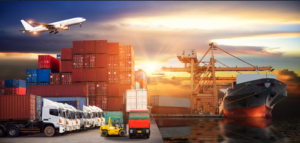The internet may have accelerated everything from romance and dating to stocks and shares trading, but until Amazon develops the equivalent of the Enterprise’s Mr Scott, we will still need logisticians, delivery firms, and port services to get the products we ship. While many businesses start off doing this in house, at a certain point you will hit a critical mass, and it makes much more sense to get external contractors on board to do this work for you.
Those external contractors are freight forwarders. The people who make it possible for the world’s worldly goods to cross the seas, span the skies, and generally get to the exact place it is needed at the exact time it needs to be there.

What do Freight Forwarders do?
Freight forwarders (FFs) complete all the paperwork, heavy lifting, and all the other ancillary tasks associated with each of the following steps of the international logistics process.
- Export Haulage – The first step, where the freight is moved from the shipper’s location to the FF’s warehouse. A truck or train is usually needed at this stage, and depending on what’s being moved and where from/to, it can take between hours, and weeks.
- Item Checkpoint – The equivalent of the class register or a reception visitor’s logbook. This is the stage where FFs check to see that all goods are accounted for, and that everything has arrived without incident, with no damage and no difficulties
- Export Customs Clearance – The country of origin needs to sign off that what is being dealt with is safe and legal to be moved. Details about the cargo and all the supporting documentation needs to be given to customs brokers. FFs will usually offer this service, but some do not. Double check with your FF to be sure. If they don’t offer it, you will need a third party customs broker service
- Import Customs Clearance – The country of arrival will now have to check that everything is okay to be received. Depending on the laws of the country in question, this could begin before the freight has even arrived.
- Destination Arrival and Handling – Once the freight arrives at the port of the country in question, the FFs then need to process several documents and bills to make sure the freight can then move on.
- Import Haulage – The final stage, where the freight is moved from the port to the intended destination.
Why do I need a Freight Forwarder?
- Cost – Moving freight around is always expensive to some extent, but moving it with a FF will always be cheaper than arranging it in-house. This is because FFs will have arrangements with the providers of step six and step one of the processes listed above, meaning they can synergise your shipment’s movement with the many others that might be going the same way. To find out just how much more you could save with a freight forwarder, click here.
- Complication – There are 194 countries in the United Nations. Even if you shrink that number by fifty percent to account for all the trade agreements, tariff blocks, and customs unions in the world, that still leaves you with 97 potential different sets of document types that you could potentially have to deal with if you are shipping internationally. Do you really want to have to study, learn, and implement all that international law? Or would you rather hand it over to a specialist who has handled it hundreds of times before.
- Calculations – Time, distance, and speed are all known things in a standard domestic delivery situation. But internationally all kinds of variables can take hold that normally no one can predict for. No one except for the people who have travelled these routes hundreds of times before, and who know the system so very well that they can predict when you packages will arrive, sometimes down to the hour.
When you’ve got a lot to move, to a lot of different places, at a lot of different times, you could organise it all yourself and make everything planned and perfected yourself, or you could devote your time to the business you’ve built, and let freight forwarders take you the rest of the way.








